“I want you all to continue to fish,” Tim Hartley told his family on June 22, the day he died.
It was hot already as the sun rose on his final morning. His loved ones sat in the grass before him, huddled in the shade of an RV parked outside a Douglas County farmhouse. They chuckled at his instructions.
It was a bit of levity on a strange and heavy day. Maybe he would be reborn as a trout, the avid angler had told his niece a day earlier. Reincarnation, he decided, was still on the table.
“One of these days, a fish is going to come up and look at you and say, ‘Hey Bella, this is Uncle Tim!’” he had joked.
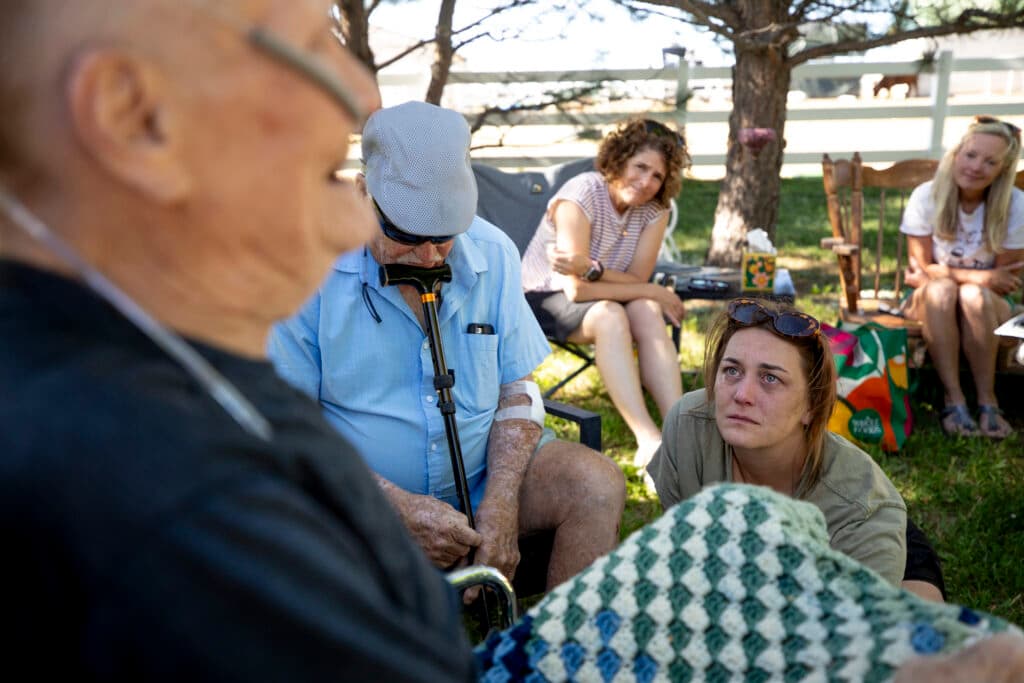
Hartley had lived with cancer in his bones for a year.
The pain had grown worse. The medication had turned his stomach and cast a fog over his mind. He had done what he could to fight the disease, and he had outlived doctors’ estimates. But he had made up his mind: His time was coming to an end, and he would leave this world on his own terms.
“I’m still scared,” the 66-year-old said, croaking through facial paralysis and tears as birds chirped above them. “This is a beautiful world. But this isn’t all there is. And I know that now. And I just don't have to be afraid anymore. I’ve got to bite the bullet. Everything's going to be better. I'm not going to hurt anymore.”
Hartley was preparing to invoke his right under Colorado law to end his own life. In 2016, a strong majority of Colorado voters approved Medical Aid in Dying, known as MAID, for people with terminal conditions who are expected to live six months or less. Hartley was eligible to receive the lethal drugs made available under the law.
When the picnic on the rolling plains was over, he would be gone. His family was in tears, but the fish joke showed there was also room for joy — and relief. They were all looking toward the end of the suffering that had defined his last months. It was exactly what advocates said MAID was meant to provide.
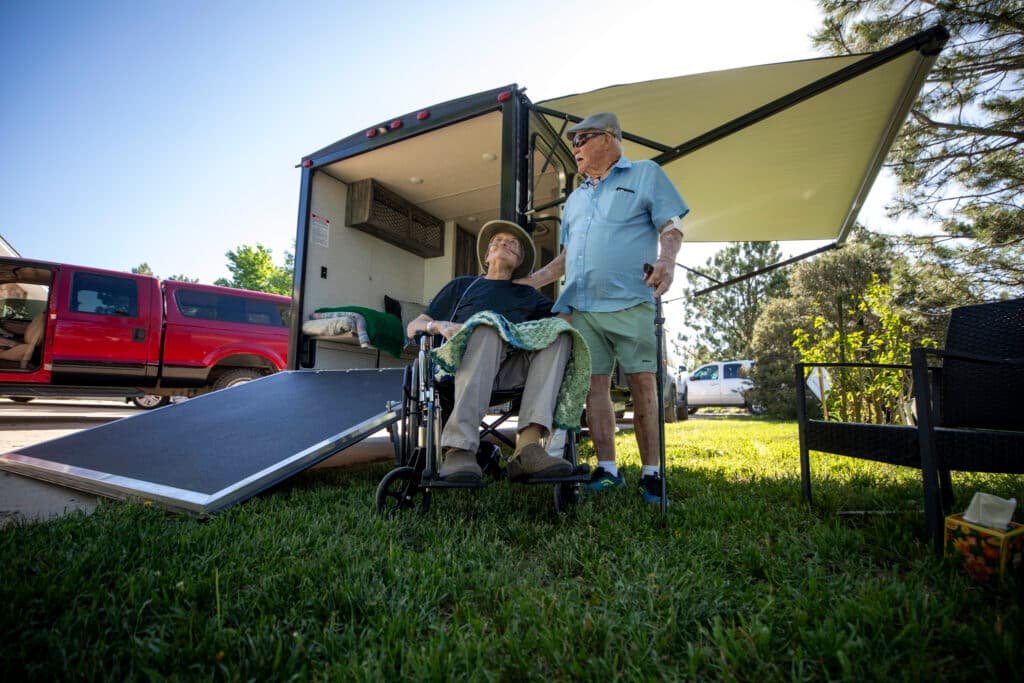
But not everyone agrees medical aid in dying is as humane as supporters say, even as lawmakers have expanded access to the process. Disability rights activists recently sued to end the practice entirely in Colorado, arguing it represents a slippery slope that could lead to eugenic killings. Meanwhile, some health care organizations have barred the practice from their facilities on religious grounds.
That pushback is one reason why Hartley drove an hour from his Wheat Ridge home to die. He wasn’t allowed to take the medication in the place where he’d been receiving care, so he turned to people who have come up with creative alternatives — in this case, the RV, which had been retrofitted as a mobile sanctuary for people’s final hours.
He was scared when he arrived at the ranch on that warm morning, but he still felt this was the right decision. He invited Denverite to document his final hours, hoping his story might inform ongoing discussions about the right to die.
Hartley decided June 22 would be the day of his death.
It had been five months since he completed the paperwork to begin this process. His health had deteriorated since then, making it increasingly difficult to leave the hospice center where he’d been living. As the weeks ticked down, he rested up to spend one last day with his family.
His younger brother, Todd, picked him up early on June 21 for a drive up Lookout Mountain and back into Wheat Ridge, where they grew up. They passed the butcher and barber shops they visited as kids, the park where they played tennis and the home where they spent their childhoods.
“Is that where I got your head shaved?” Hartley asked his younger brother gleefully.
“That was down on Sheridan,” Todd said, smiling. “I came home with a bald head. And Mom, did she go back down there, Tim, and raise hell?”
“Yeah. And then they all yelled at me for getting your hair done,” Hartley said.
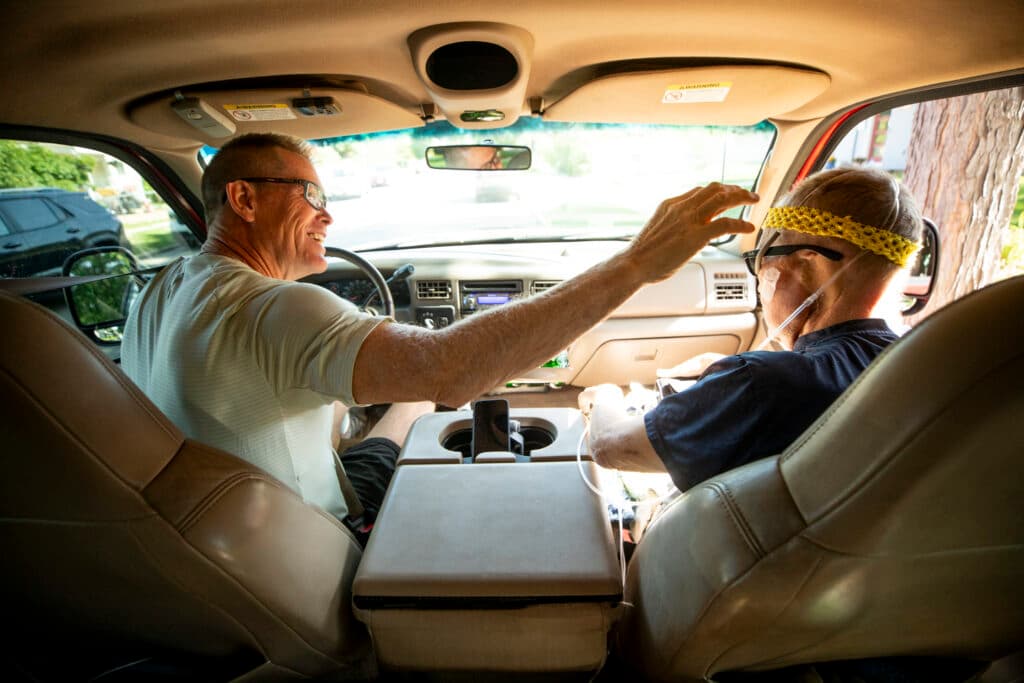
Todd (left) and Tim Hartley go for a ride through Wheat Ridge, where they grew up. June 21, 2025. Kevin J. Beaty/Denverite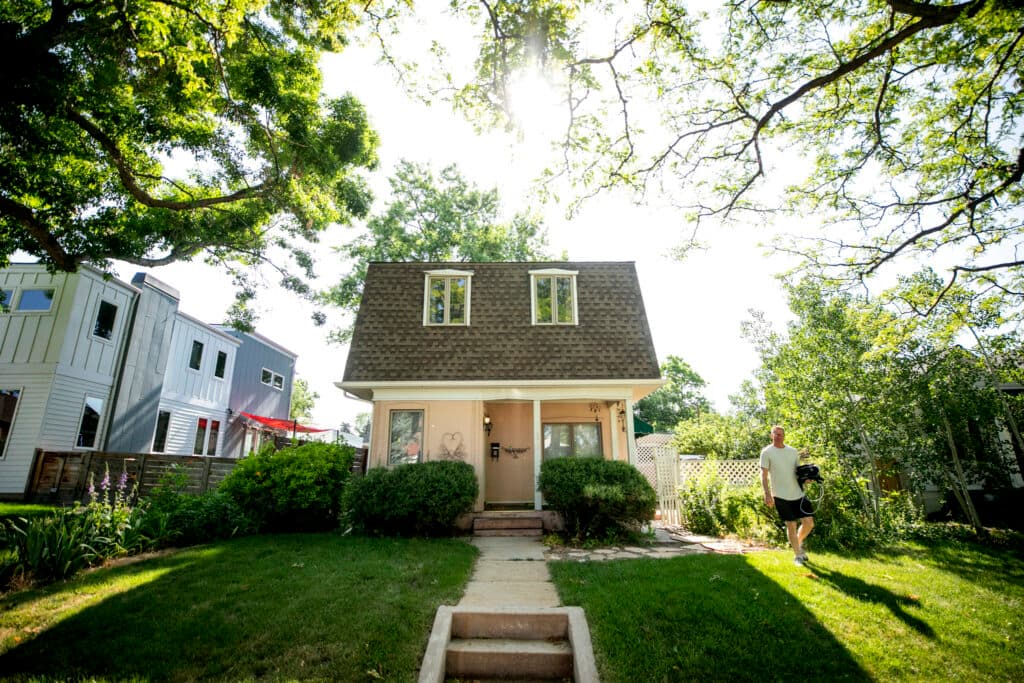
Todd Hartley exits the backyard of his childhood home in Wheat Ridge, which was occupied by his brother, Tim, before he moved into a nearby hospice facility. June 21, 2025. Kevin J. Beaty/Denverite
Hartley was a wildly independent kid, they both said, so it was no surprise his life would end with such intentionality. He was a fearless backcountry skier, an explorer and a troublemaker. He liked to work with his hands.
“I was a welder out of high school. I knew I wasn't going to graduate,” Hartley told us. “So I went to trade school, got a good trade, learned a lot. Got me a job that would support me for the rest of my life.”
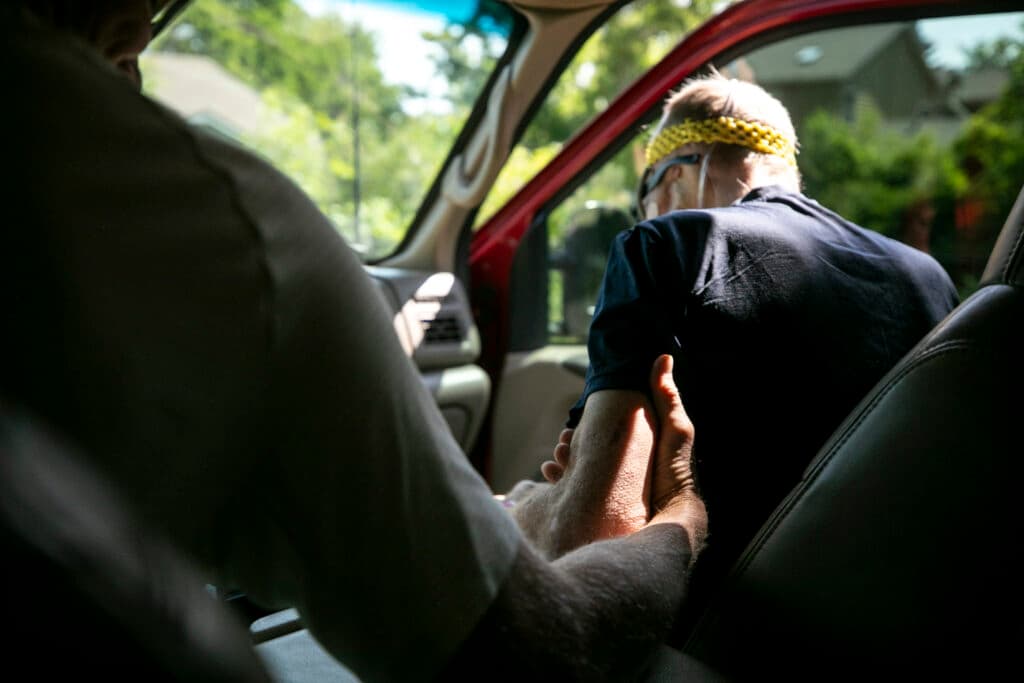
He left Wheat Ridge about as quickly as he could, using his knack for hard jobs as a ticket around the world. He was an engineer on a research ship and other vessels, sailing across the Atlantic and deep into the Caribbean. He moved to Alaska, where he led fishing expeditions for tourists and hunted steelhead salmon. He was never happier than when he was alone in the woods with a fly rod in his hand.
Todd said they were always close, despite a five-year age gap and Hartley’s constant travels.
“He'd be gone for seven years, and he'd come back, and then he'd leave again,” Todd said as they drove through their old neighborhood together. “He'd come back and it was like he never left.”
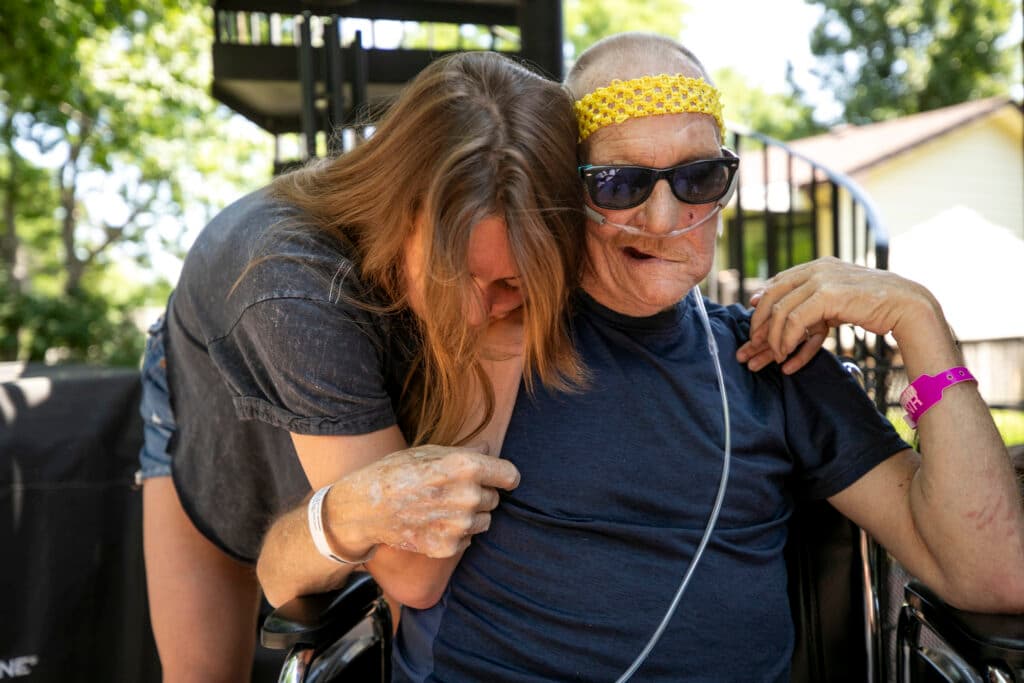
“My bucket list is empty.”
About five years ago, Hartley was diagnosed with basal cell skin cancer, a common diagnosis in his family that was likely worsened by all the time he spent outdoors. It was treatable, but he let it fester. It got so bad that doctors had to remove his left ear to address it. Then, a few years later, Hartley noticed a strange feeling in his chest.
“It was an itch and it was a sore shoulder, and it was typical old age. I was 62, 61 years old. I'm like, ‘I'm just getting old,’” he said, surrounded by equipment in his hospice bed. “I knew when they were sending me to get an MRI that my days were numbered. And boy, they were really numbered. They gave me a month and I've lived a year.”
The time came, last spring, when Hartley needed more help than Todd and his family could offer. He moved into a local hospice center, where nurses would feed him painkillers until the disease finally took him. The drugs helped, but not all the time. He was ready to be done.
“I fought many battles and I lost the big war. That's what happened. I just ran out of gas,” he said. “It was time to give up — not give up, give in to it.”
Hartley learned about medical aid in dying through a social worker, who walked him through the steps to be prescribed lethal medication. In all, 313 people received the drugs last year in Colorado, a record high since they became available in 2017; Colorado does not track how many of those people actually used the medication.
Tim talked to his family, despite his fears that they wouldn’t understand. It felt like a reasonable decision. Why prolong the inevitable, especially when waiting was so hard to bear?
But it was still a scary proposition, especially as his paperwork was approved and the chosen day drew near. He’d been having vivid dreams of strangers coming into his room, wordless visitors at the foot of his bed. He knew he would have to self-administer the drugs that would kill him, as required by state law.
“I’m scared to death. I am. But I'm scared of nothing. I don't know why I'm afraid of it,” he told us as nurses bustled past his door. “It's the unknown.”
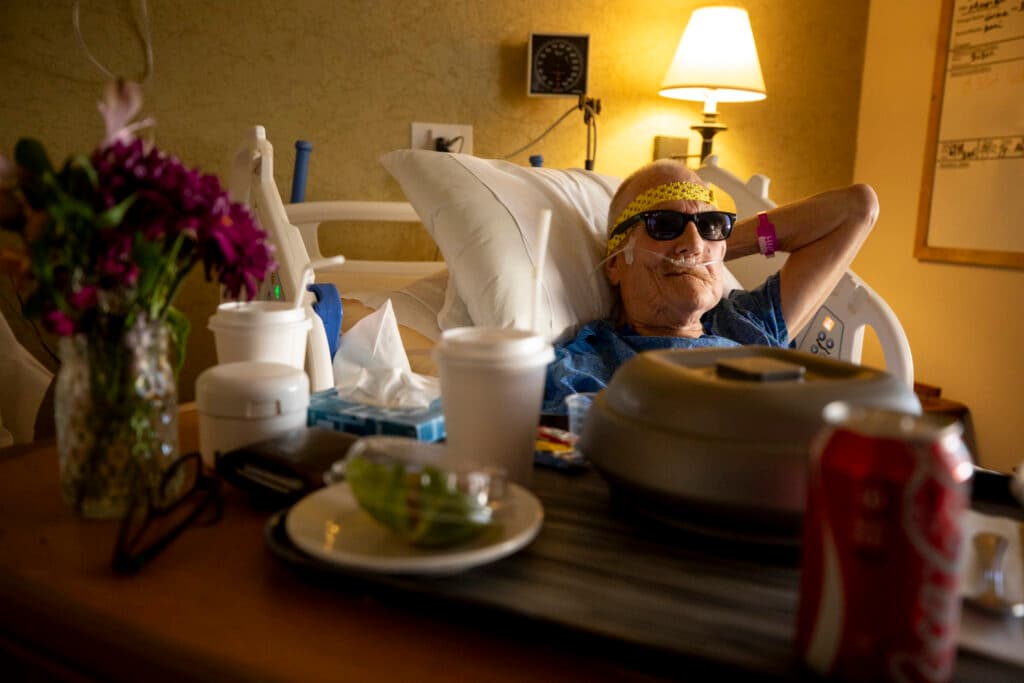
He didn’t let the fear define his final weeks. From his bed, he regaled hospice staff with stories of his adventures: the bear he met face-to-face during a fishing trip, the sailors who smuggled cocaine onto his ship and back home to the U.S.
“I was kind of a thrill seeker,” he said, grinning. “I decided to chase my dreams when I was young. And I completed that. And my bucket list is empty.”
Hartley was also 30 years sober, and completed recovery programs that forced him to make amends and resolve grudges while he was healthy. He had a lot of time to think, lying here; he was grateful he didn’t bring any guilt or loose ends with him.
He could still choose to call it off.
Colorado’s law is meant to give patients the final say in whether they use medical aid in dying provisions.
Medical providers may only prescribe lethal drugs to a person “in sound mind” who has a terminal diagnosis and is expected to die within six months.
The law states patients must make two spoken requests and a written request to begin the process.
“I request that my attending physician prescribe medical aid-in-dying medication that will end my life in a peaceful manner if I choose to take it,” the request form reads. “I understand the seriousness of this request, and I expect to die if I take the aid-in-dying medication prescribed.”
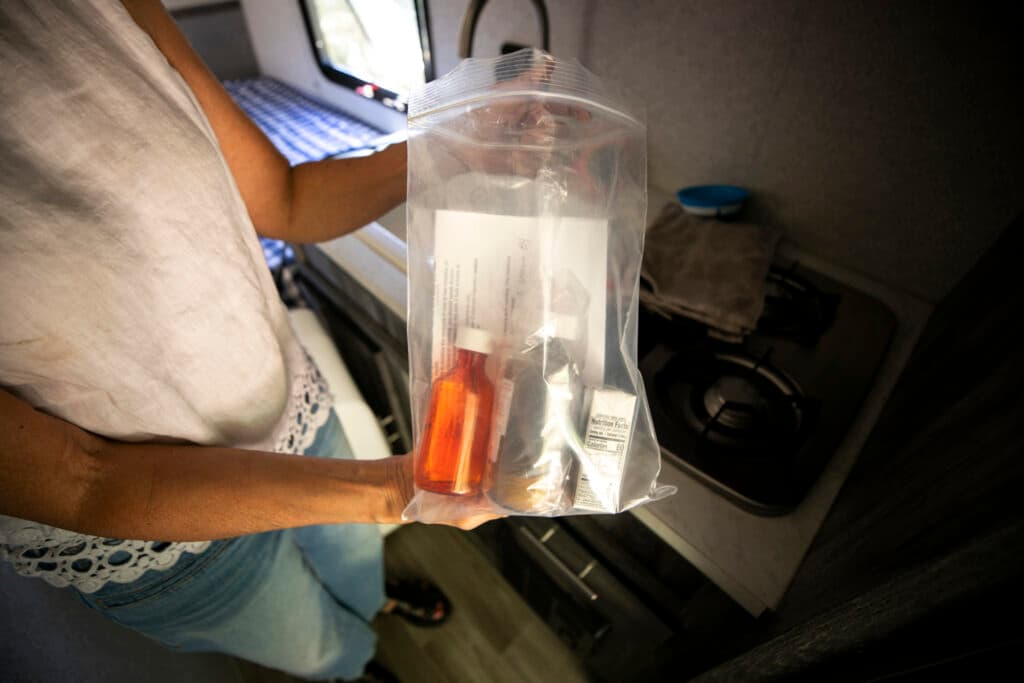
Dr. Barbara Morris is a Denver-based geriatrician who runs End of Life Options Colorado, a nonprofit that aims to educate providers and patients about their rights in this process. The law’s “guardrails,” she said, are meant to ensure only people with no alternatives get access to lethal medication.
“It's aid in dying, in a situation where these patients are facing unbeatable odds,” she said. “The goal is a peaceful and dignified death at the time and place of the patient's choosing when they have a terminal illness with a bad prognosis.”
The process is only open to Colorado residents. But in May, a Minnesota man with terminal cancer sued the state, arguing he should be allowed to travel here to end his life, too.
Not everyone agrees this is good, or safe.
Colorado’s legalization of medical aid in dying has drawn stark opposition from critics, most recently from disability rights activists who filed a lawsuit aiming to abolish the practice. Many of those advocates fear the allowance could have catastrophic consequences — even if it works for people like Hartley.
Kaye Percy is deeply frightened by the state’s embrace of aid in dying — so deeply that they moved out of Colorado soon after the ballot measure passed.
“I said, ‘It's a good thing I was already thinking about moving, because I will not be in a place where assisted suicide is a box that my doctor checks for me,” they said, “because they don't ask you, when you have disabilities.”
Percy is a longtime activist in the nation’s disability rights movement, which has deep roots in Denver.
The fear, they said, is that doctors, or even family members and guardians, could pressure people to die to avoid paying for treatment for chronic and disabling conditions. They see MAID as an extension of the U.S. government’s decades-long practice of forcing people into institutions and denying their civil rights. Even the MAID law’s requirement for a “terminal” condition is little reassurance.
“In my 41 years, I have been given a life expectancy of six months or less at least five times, that I'm consciously aware of,” Percy told us. “I had a diagnosis as soon as I was born. The nurse told my mother, ‘Do not name this child.’”
A similar argument has been made in opposition to the United Kingdom’s recent legalization of medical aid in dying — that it’s a desperate option for societies that lack capacity to care for their own.
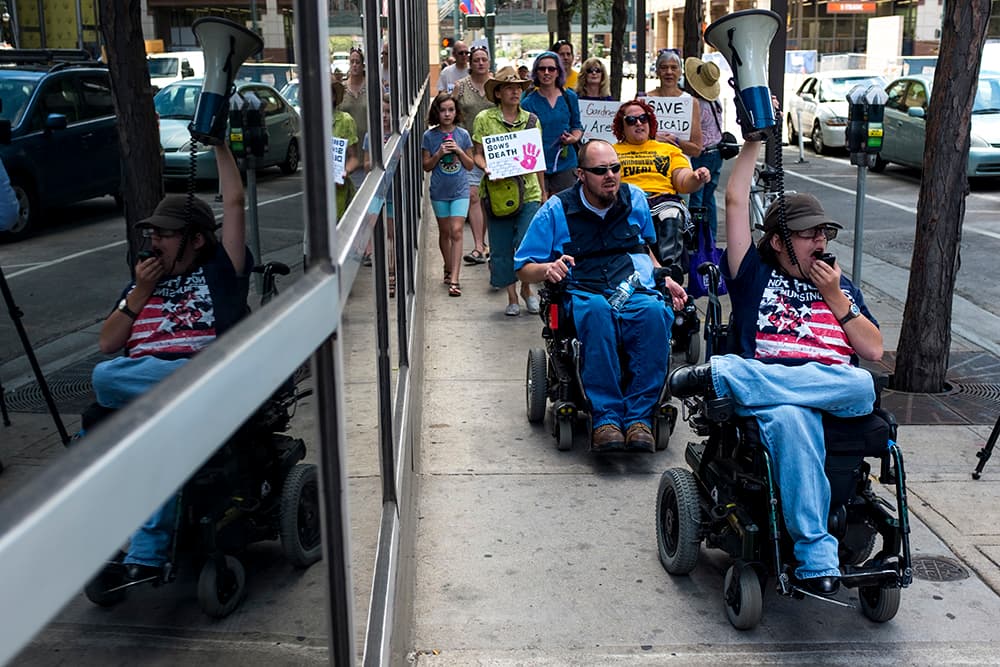
The advocacy group ADAPT joined the lawsuit last month challenging MAID’s legality in Colorado, arguing that the policy violates the Americans with Disabilities Act. They were joined by the Institute for Patients’ Rights, United Spinal Association and the activist group Not Dead Yet.
MAID, they argued, is a “discriminatory system that steers people with life-threatening disabilities away from necessary lifesaving and preserving mental health care, medical care, and disability supports, and toward death by suicide under the guise of ‘mercy’ and ‘dignity’ in dying.”
The language mirrors another, parallel lawsuit in California.
For her part, Dr. Morris said she hasn’t seen any evidence of coercion in this system, and said her colleagues usually work with people, like Tim Hartley, who are clearly dying.
Still, Percy and their colleagues say this is one of “many slippery slopes” that could ultimately enable a eugenic purge of people with disabilities. Granting the right to anyone, they fear, will affect many others.
“When assisted suicide comes to the door, although an individual may say, ‘I'd like to have that right,’ they don't know that they're dragging down an entire community with them,” Percy said.
In the face of opposition, MAID advocates have had to get creative.
While the recent ADA lawsuit challenges the law itself, other opponents have already limited where and how people can use the right to die in Colorado — with significant effects for patients like Tim Hartley.
It’s something Dr. Morris knows intimately. In 2019, she lost her job at Centura Health over the hospital system’s policy barring the practice on moral grounds. Morris had a patient who was desperate to escape his pain, and she was fired for challenging the policy in court.
Many hospitals and hospice centers refuse to allow MAID because they are operated by religious organizations that see suicide as a sin. That was also true of the facility where Tim Hartley spent his final weeks. He would not be allowed to take the lethal drugs there.
“We still have some pretty big challenges and barriers in Colorado with hospices, and frankly with big health systems who have opted out, which the law allows,” Morris said. “It's a big barrier, particularly in communities outside of Metro Denver where there might be only one hospice. And if that hospice has very stringent rules about this, that can be a real challenge for patients and their loved ones.”
So, supporters of MAID have been looking for alternative solutions.
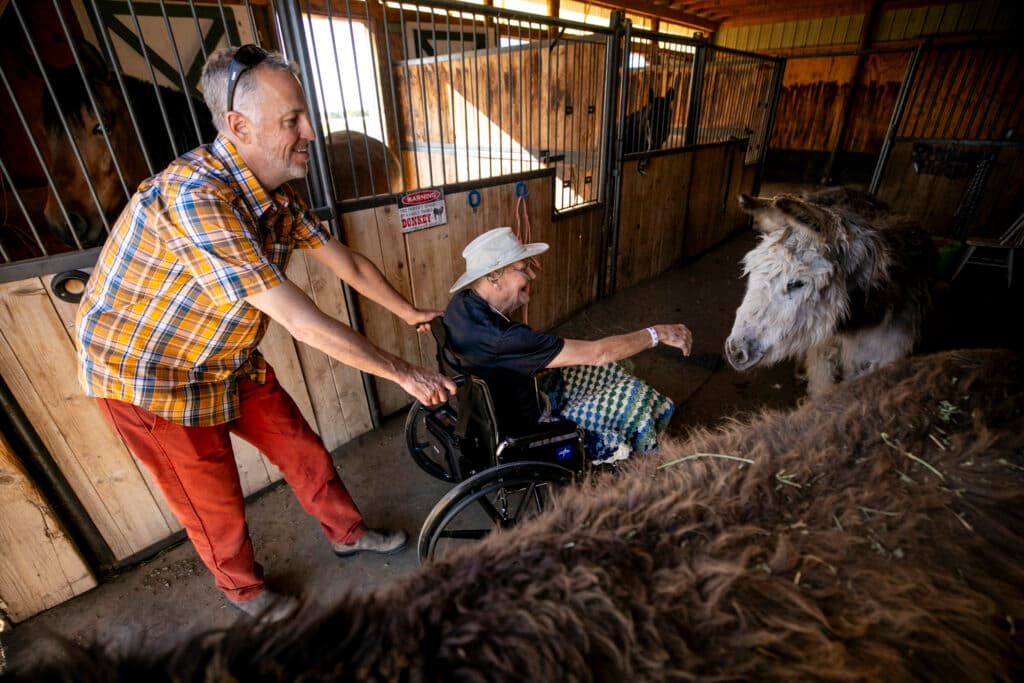
As Hartley went through the process, he was connected with Eric Jepsen, who serves on the board of Morris’ nonprofit and runs his own organization, BeautifullyMAID. He had just bought an RV trailer and hoped it would provide a convenient, mobile space for patients to take the lethal medication. It was comfortably furnished and ready to be parked anywhere he was invited.
“Most of the facilities won't allow you to take medical aid in dying in their facility. And so people are left to themselves to figure out where to go,” he told us. “I'm not saying that people shouldn't be able to die in a hospital. We should be able to do what we want.”
Tim Hartley would be the first person to use the vehicle. It’s how he and his family ended up on a stranger’s ranch as he prepared to die.
Hartley stood by his decision, and passed peacefully on a sunny Sunday afternoon.
He moved out of the hospice center in the morning, when Todd picked him up for one last drive. They caravanned south with Hartley’s father, sister-in-law, niece and dog in tow.
The family had been bracing for this day, but they still weren’t sure what to expect when they arrived on the rural property.
Todd helped his brother into a wheelchair. Then Jepsen rolled him toward a pack of furry donkeys waiting to greet him. Hartley cackled in delight as they clamored for treats and sniffed his hand.
“I didn’t expect to laugh like this,” said Susan Hartley, Hartley’s sister-in-law, as she watched a pig waddle across the yard.
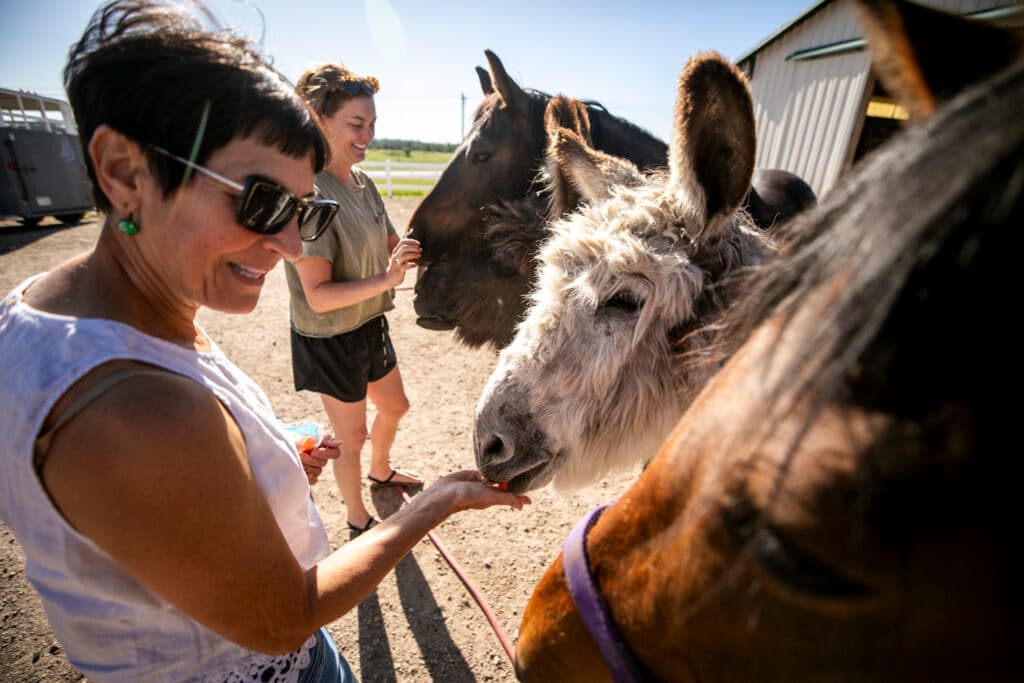
A picnic was waiting for them — including a table with flowers, an icebox full of drinks and chairs set up on the lawn. Jepsen’s trailer was there too, with one wall folded down to reveal the interior. The inside was clean and sparse, with a bed made up for Hartley.
It was a shame Hartley had to leave hospice to take the medication, Jepsen said. This point in people’s lives should be as easy as possible, though the restriction did push them to this verdant place, something, “beyond the tubes and the industrial nature that hospitals can be.”
At about 10 a.m., Hartley’s family left the animals in their pens and gathered around him. Susan prayed for him and read Psalm 23: “The Lord is my shepherd; I shall not want. He maketh me to lie down in green pastures: he leadeth me beside the still waters.”
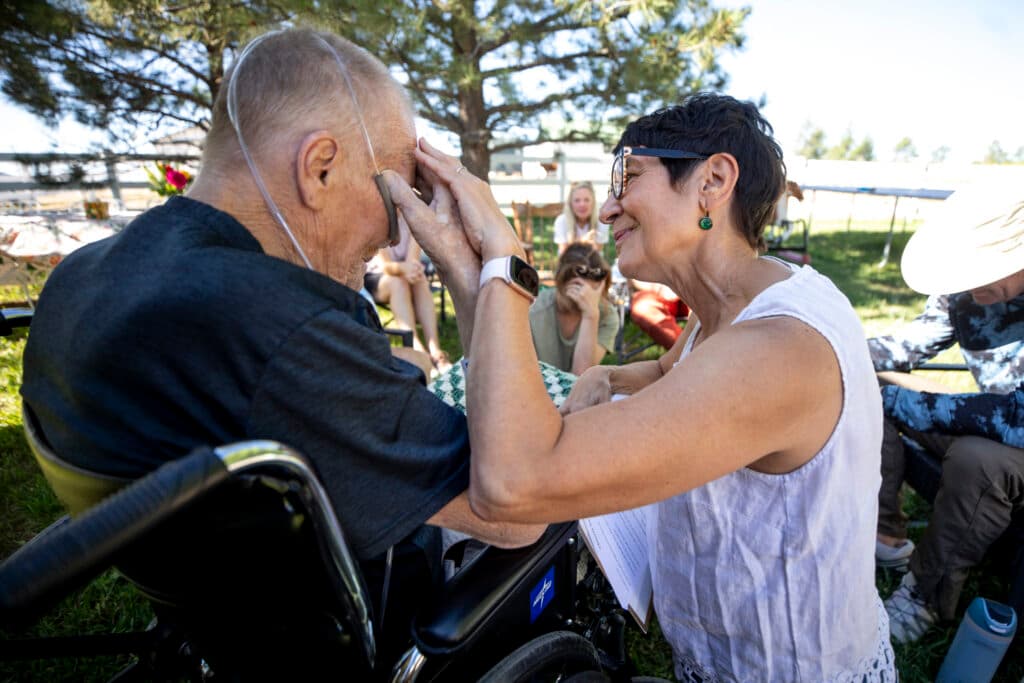
“We thank you, Father, for the gift of Tim. What an incredible blessing he has been,” Susan said. “We ask you to bless him on this journey. Grant him peace beyond all understanding as he transitions from this world.”
Hartley, choking up, said he was still afraid. But he knew what he wanted to do.
“I want to thank everybody for being here,” he said. “I wasn't really sure I had the courage to do this until we were on our way out here. And just to see where I was going, to see my dog, my family, just made me feel like it was time to move on.”
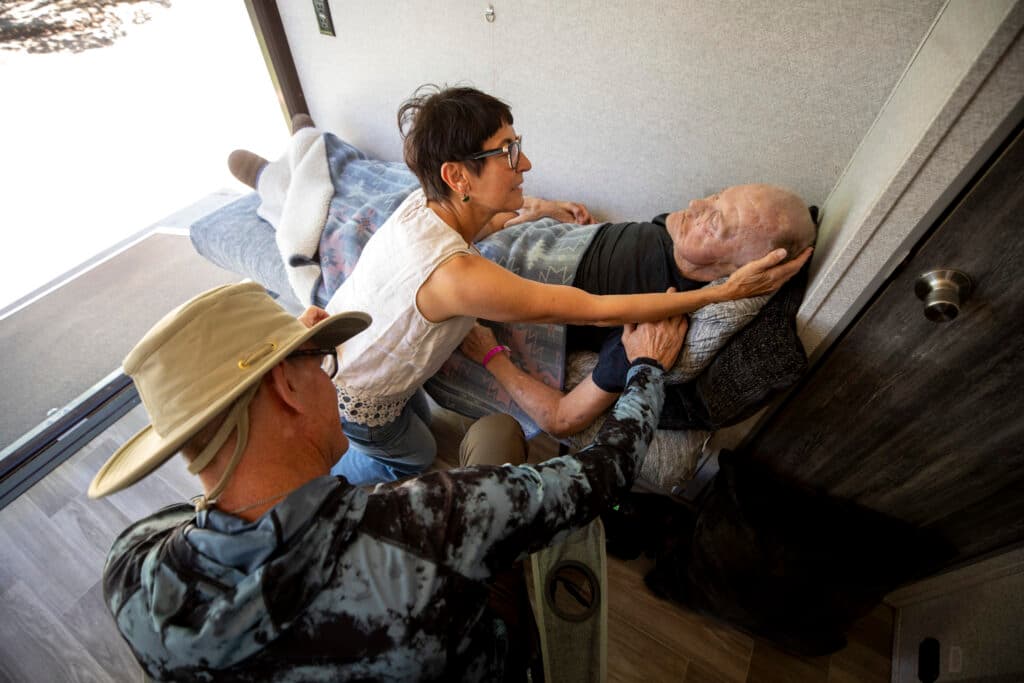
Todd and Susan helped him into the trailer and tucked him into the bed, then handed him a bottle of medication topped with a straw. Hartley drank it without hesitation. It burned, he said, as Susan fed him a chaser of mango sorbet.
About ten minutes later, he fell asleep. He smiled as he drifted off, Susan later recalled, even on the paralyzed side of his face.
Todd sat with him and held his hand. Susan sang to him. Bella, their daughter, started the playlist they prepared together; Van Morrison’s “Into The Mystic” broke the morning’s quiet.
“Hark now, hear the sailors cry. Smell the sea and feel the sky. Let your soul and spirit fly. Into the mystic. I don't have to fear it.”
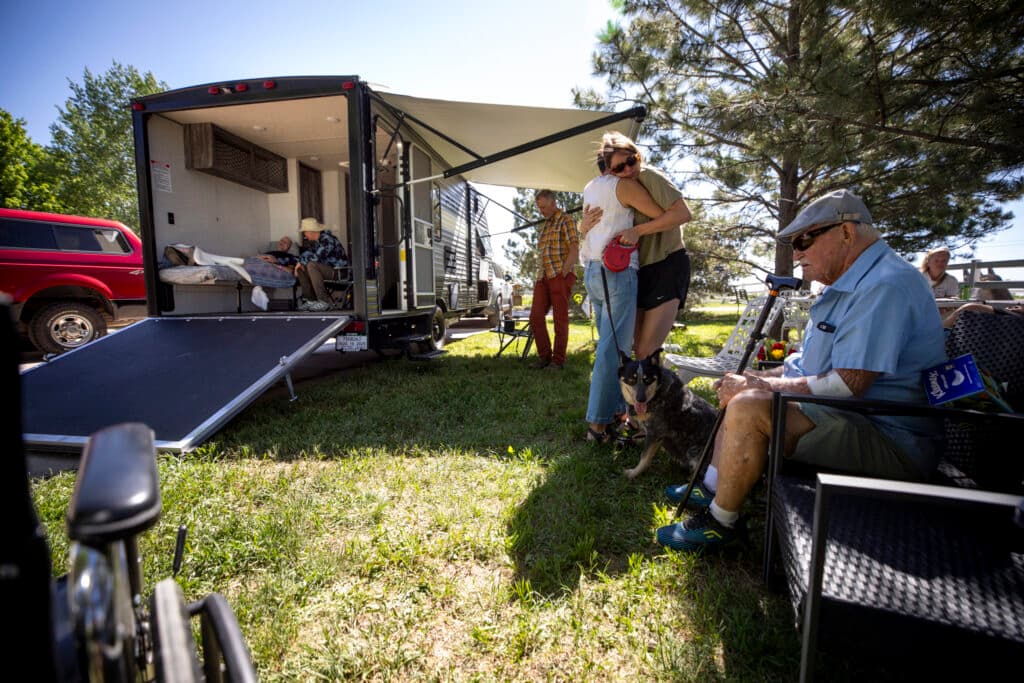
Then they waited. His family told stories and rested in the shade for three hours as the moments between Hartley’s breaths grew longer and longer. Then he was gone.
Susan made a call, to let his doctors know it was over. Someone from the mortuary would come to collect his body. They would hold a memorial service come autumn.
And they would keep fishing, they said, especially Bella. It was how she always felt connected to him.
“He’ll always be with me on that river, no matter what I do,” she said. “But I am looking forward to him being at peace.”
Correction: This story has been updated to clarify that Eric Jepsen did not help the Hartleys prepare the medication.













